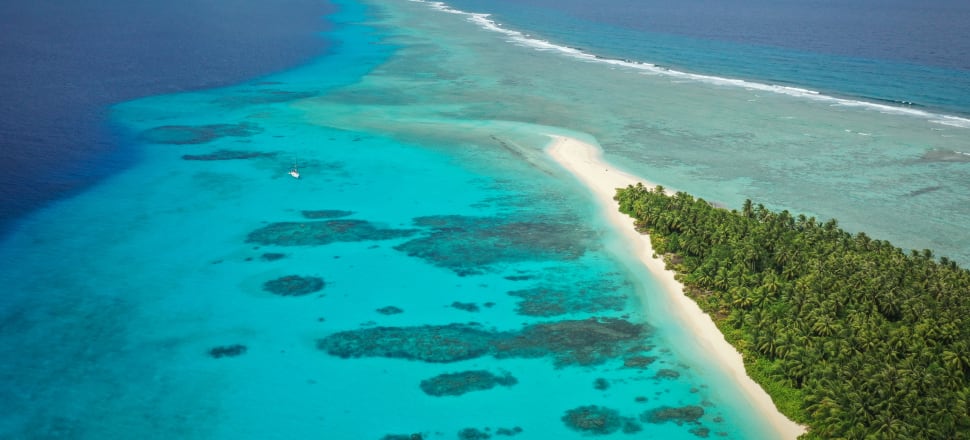
A group backstopped by one of the world’s most at-risk countries is pushing for the greatest sector commitments seen so far in the fight against climate change
A pledge that developing countries won’t wear the costs of ships going green will this year go before the International Maritime Organization.
This submission, along with three others, comes from a group known colloquially as the 6-PAC, delegates from various nations including Marshall Islands, Tuvalu, Kiribati, Solomon Islands, Fiji and Tonga.
READ MORE: * NZ’s role in green shipping corridors * Govt cautiously floats transformative transport plans
“It will be interesting to see if New Zealand backs the Pacific when we go hard,” says Dr Peter Nuttall.
Nuttall is the scientific and technical advisor for the Micronesian Center for Sustainable Transport, an entity set up by Marshall Islands in 2015 to address the need for Pacific states to transition to low carbon transport. It provides support and intel to 6-PAC.
The island nation is technically a heavy-hitter in the international shipping sector due to its massive flag of convenience register, but sitting just two metres above sea level it also feels the immediate effects of climate change.
Responsible for about 3 percent of global emissions, ships emit around one billion tonnes of CO2 each year.
In 2018, with support and expertise from the Center for Sustainable Transport, the 6-PAC delegation demanded the sector reduce its emissions. International Maritime Organization members agreed, but this year 6-PAC is going further.
“We are currently negotiating for the revised strategy, which must be agreed to this year, where we are demanding 100 percent [greenhouse gas reductions by 2050] and we have the majority numbers to do so."
For Nuttall though, how that reduction occurs is a critical component of the negotiations.
“Up until now everything has been based on temperature limits but we haven't said who should bear the cost of that and who should get the benefit.
"So it's conceivable that shipping decarbonises, but half the world is left with old ships that they’ve got to pay enormous penalties on, so the developed world gets richer and richer with cleaner and cleaner ships. So our question is, how do we ensure an equitable transition?”
"Is New Zealand going to follow its domestic economic imperative, or is it going to follow its political commitment to back the most ambitious Pacific policies?” – Dr Peter Nuttall.
A resolution brought by 6-PAC committing International Maritime Organization members to that transition will be on the table this year.
The group will also push for a set carbon price, with a large share of the profit going to vulnerable countries.
“We're also demanding a carbon price, which now everybody seems to accept by and large. And we're insisting that the revenues from that come at least of the perceived impact upon the most vulnerable states that will create a climate fund of tens of billions of dollars a year."
“The industry is saying you give all that money back to us, that is, you subsidise the industry or its R&D. We're saying no, why should we subsidise you? You don't pay any tax.”

Nuttall said while it was likely some of the fund would go on subsidies, at least half should go to the victim countries of climate change and pollution.
“The principle of polluter pays at international law is incredibly clear. At the moment it’s being paid by the most vulnerable and future generations.”
It will also push for levels of ambition – shorter term decarbonisation targets essentially – so that the 2050 goal is not left to the last minute.
“No one really knows what a green corridor is. It’s vague, it’s a nice political catch cry. They’re just greenwash. We've got a green corridor proposed for coal from Newcastle to Shanghai. I mean, how can that be green?” – Dr Peter Nuttall
The question for Nuttall is whether New Zealand will be there to support as a Pacific partner, albeit an International Maritime Organization lightweight.
“New Zealand has come out and said it will support us on polluter pays, but not whether it's going to support us on equity, which would place a responsibility on New Zealand as a very rich, developed and emerging country.
“So is New Zealand going to follow its domestic economic imperative, or is it going to follow its political commitment to back the most ambitious Pacific policies?”
In 2021, New Zealand became a signatory to the Clydebank Declaration. That commits the Government to support the establishment of green shipping corridors – zero-emission shipping routes between two ports.
The agreement strives to establish at least six green corridors by 2025. This requires supplies of zero-emissions fuels, the infrastructure required for decarbonisation, and regulatory frameworks.
However, Nuttall is far from impressed at the declaration,
“No one really knows what a green corridor is. It’s vague, it’s a nice political catch cry.
"They’re just greenwash. We've got a green corridor proposed for coal from Newcastle to Shanghai. I mean, how can that be green?”
Working group discussions on what the International Maritime Organization’s revised strategy for greenhouse gas reductions get underway in March, with adoption expected in mid-2023.








